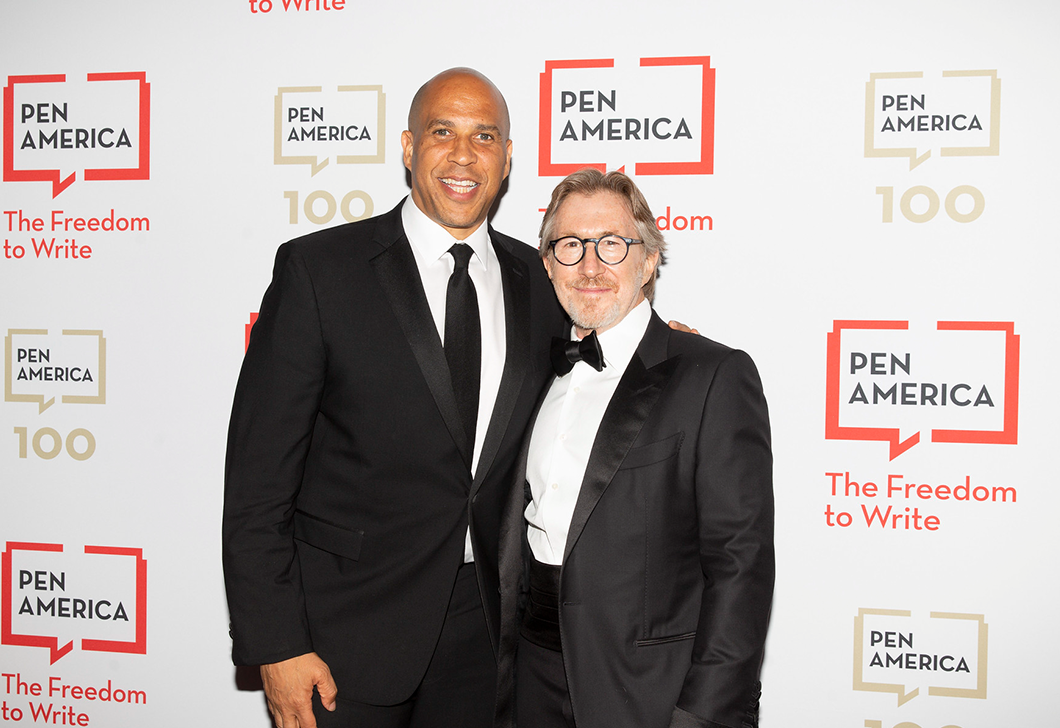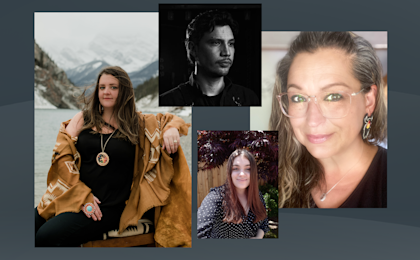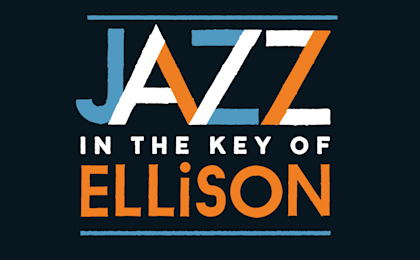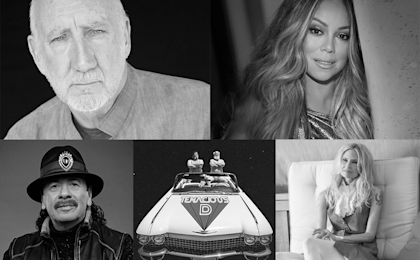Cory Booker and Don Katz on Rethinking Cities and Creating Audible

At the 2022 PEN America Gala, Audible Founder and Executive Chairman Don Katz was celebrated as the Business Visionary Honoree. As shared by PEN, “Under Don’s vision and leadership, Audible has spent over 25 years at the forefront of the continuous evolution of storytelling, having commercialized the world’s first-ever digital audio player, created a new category for a wealth of creativity and diversity of perspective, catapulted audiobooks into the entertainment mainstream, and in so doing supported thousands of writers and actors.”
Senator Cory Booker, in introducing Katz, which you can watch here, called him an "extraordinary disrupter." He continued, "Audible was the first major company that moved its headquarters to Newark when I was Mayor. I hope that you all can understand how radical that was. People had given up on Newark. People ignored our city. People declared our city dead. When I had become Mayor, the idea that a corporation would move its headquarters there is a testimony to the visionary understanding of conscious capitalism. Don Katz saw what others had rendered invisible. He saw the worth, he saw the dignity, he saw the strength and potential of our city. He understood that Newark was us. That the American dream wasn’t secure anywhere unless it was secure everywhere."
These are Katz’s remarks from the event—watch or read in full.
Back in 1997, I met a law student who told me he had been dissuaded from founding a non-profit in Newark after graduation. Instead he planned to unseat an entrenched City Council member. I’m from Chicago, so the idea of an outsider winning a local ward election – let alone a former Stanford football player who was also a Rhodes Scholar and a Yale Law grad – caused me to say to my wife Leslie after dinner, “that Cory Booker seems like great guy, but I give it a year until he’s working at some investment bank on Wall Street.”
And as if he heard this and took it as a challenge, Cory has spent years proving me wrong. Thank you, Senator, for your courageous moral leadership at a time when your voice is so desperately needed. And thank you too for introducing me and for inspiring me and what Audible stands for.
Being part of Newark’s renaissance has indeed become a corporate purpose down to Audible’s core written principles. Our focus on structural inequality has led to an array of direct, programmatic and preferably scalable initiatives, some of which you heard about from Cory just now.
Thank you to my ever-persuasive friend Markus Dohle and to Suzanne Nossel and everyone at PEN America. Freedom of expression and the right to tell the truth are clearly in the balance, as repressed voices and destructive digital discourse mark the moment. PEN stands against these dark tides. And so does Audible. Being here tonight with so many people I have known throughout two careers, I think of a few of the many people who touched the course of my life who are gone.
The great editor Aaron Asher convinced me to spend two of the six years it took me to finish my book Home Fires, completely rewriting it to become a more accessible story. I think Audible occurred in part because, however subconsciously, I didn’t think I could top Home Fires and its rendition of the long-form, character-driven narrative non-fiction style I was able to sharpen as a writer during Rolling Stone magazine’s first decade.
As the Senator mentioned, my writing life and Audible were inspired on so many levels by Ralph Ellison, who taught me during long tutorials how to understand the music I heard when I read.
From Ralph I knew that there was a reason that Newark-born Stephen Crane wrote with genius in an American voice when his contemporary Henry James did not. Ralph taught that truly American writers could hear the verbal democracy of soldiers and street urchins talking, the occasionally-true salesmanship of peddlers, the overt lies in tall tales told around campfires, and lamenting in the fields.
In 1996, two years after Ralph died, when the broadband internet was still years away, a tiny crew of true believers – two of them here tonight – came together to compose a vision statement for Audible, though back then the company was called Audible Words. The statement said: “We will build a new medium that will redefine and enhance the nature of spoken information, education, entertainment, and other modes of verbal expression that we will help create ourselves… We will change the way an individual controls the what, when, where and how of the words they hear.”
My personal pantheon includes Robin Williams, who believed in me and the Audible dream at the beginning and created short-form Audible Original programming years before the word podcast was coined. We had no money in 1999, so Robin invested his own money in a vision of the possible almost everyone I knew thought indicated I had lost my mind. Robin was paid in warrants, and on national TV together once, he pointed at me and said I’d paid him in confederate currency.
Two years later I got to know Steve Jobs. Steve admired the technologies supporting the digital audio player Audible invented and began selling in 1997, more than four years earlier. But what we bonded over most often was our shared belief in the emotional, even primordial power of being read to. We agreed that nobody could listen to E.B. White read Charlotte’s Web in his strangely affecting Yankee way and not cry. Steve understood that once you can actually hear the syncopations in language, when well-wrought words are refracted through artfully nuanced performance, you will want to have this experience every day.
The earliest Apple iPods were for transferring physical music to a digital device, but they also worked with Audible’s audio service, because Steve agreed that given the vibrant wonderland of American vernacular expression, the spoken word deserved to ascend to the media mainstream alongside music, all permutations of film and TV…and books.
Audible, for many tens of millions of people around the world, has become so much a way to read that few of them bother to describe the habit as listening. For many, the service is an antidote to loneliness and an escape from the myriad traumas of the times, and it is a way to learn how to live a more fulfilled or successful life. It is a way for countless children – and families with children struggling with language processing challenges – to learn.
It is gratifying that Audible has driven billions of dollars into the business of culture. And it is gratifying that Audible has directly paid more than 60,000 talented performers over the past decade (as Senator Booker reported), along with many more authors, journalists, playwrights, screenwriters, poets and many of the greatest musicians who tell stories via our Words + Music series.
New Audible Original listening experiences written to our singularly intimate aesthetic have been created by many in this room. Our global Audible’s around the world – like Audible Suno, our Hindi language Audible Original service and programs like Audible Theater – unveil stellar new productions by the day. Search on Audible’s vast LGBTQ+ Originals repertoire, or our deep Raising Black Voices collection, to get a sense of our efforts over many years to capture new and historical voices that ought to be heard.
While it is in many ways so much water under the proverbial bridge, during those early years – more than a decade when Audible was fragile and near-death experiences were constant – skepticism about the idea was the least of Audible’s challenges. Aggressive and often self-destructive business resistance joined moralistic outrage over what was seen as a challenge to text itself—or as it was occasionally posed – to “civilization” itself.
It should be said that for centuries fear and active resistance to change have been a primary institutional reaction to new, invariably technology-born modes of expression that convey information, education, entertainment and art. Written words, whether chiseled into stone or conveyed via the introduction of handwriting centuries ago, were resisted by the stewards of cultural authority from the Greeks through St. Augustine, when reading silently was thought to be the devil’s work. The invention of early video recording technologies and cable television – which the movie industry tried to erase in the courts – and just about all technology-spawned media inventions, including the way Audible created and embraced digital technology – came under attack.
But look more closely at these many historical junctures, and you will see the most creative people bringing their talent close to these moments to give rise to Golden Ages. This was true for early radio – as the most gifted vaudevillians created a new listening aesthetic. There were golden ages for silent film, for recorded music, for talkies, for on demand episodic television, and now for Audible and the listening revolution.
As a universe of millions of free chat shows and fast-twitch social media interactions distract from the deeper purposes and often electrifying words and voices that that the best professional creators can turn into literate listening and original art, the most gifted writers and performers and their most creative intermediaries should now draw closer together.
Whether to redress the darkness of the times as PEN continues to do, or to capture and convey voices that ought to be heard after years of marginalization…or just to tell new stories worthy of the telling…we have a lot of work to do together.
If there are people here tonight who have good ideas for Audible or me, or if you want to explore the profound power of giving people a chance by moving a company to join us in Newark, or if you want to come see the Audible Newark campus including the 80,000 square foot Cathedral we’ve renovated as a home for our technologists – please get in touch. Thank you, Cory. Thank you, PEN America. Thanks to my one-of-a-kind family here tonight, who believed in me always over two careers largely working without a net.
And thanks to the many people here today who have touched the varied chapters of my life in so many ways.


